News
Mondelēz expands Cocoa Life into Brazil
26 Oct 2018Mondelēz International has announced the expansion of its global cocoa sustainability initiative, Cocoa Life, in Brazil. The company says that Cocoa Life aims to create empowered and thriving cocoa farming communities.

Mondelēz International has announced the expansion of its global cocoa sustainability initiative, Cocoa Life, in Brazil. The company says that Cocoa Life aims to create empowered and thriving cocoa farming communities, by helping farmers to become more profitable and sustainable while safeguarding the future of chocolate. Around the world, Mondelēz claims that the initiative is already making progress in five key cocoa origin countries: Ghana, Côte d’Ivoire, Indonesia, India and Dominican Republic.
Mondelēz International has been supporting cocoa production in Brazil since 2014 and says it will build on this work, and on the learnings from other origins, to fully deploy the Cocoa Life program. In Pará, the company will invest around $200,000 per year over the next three years to empower cocoa farmers and to nurture thriving and independent cocoa communities. In Bahia, where farmers are said to face a myriad of challenges related to crop management, Cocoa Life is designed to provide guidance on the latest techniques in farm rejuvenation and good agricultural practices to improve yields and the quality of the cocoa produced as well as to mitigate environmental impact. The cocoa beans produced with Cocoa Life support will be part of the Mondelēz International supply chain network for its Lactachocolate portfolio.“We are thrilled about adding Brazil to our Cocoa Life initiative. Brazil is not only a cocoa-growing country but it’s also an important chocolate manufacturing hub, home to one of our local heritage brands, Lacta, one of the country's favorites and top-selling chocolate brand," says Christine Montenegro McGrath, Chief of Sustainability & Well-being. “Cocoa Life has already made a significant impact in West African cocoa farming communities and we expect it will do the same in Brazil. In addition, the program will also look at contributing to the preservation of the Amazon rainforest and to the community development.”The Cocoa Life launch in Brazil is the result of a collaboration with The Nature Conservancy (TNC) and its “Forest Cocoa” project, which was created to foster low-carbon family-based farming, generate social and economic benefits and engage farmers to commit to zero deforestation targets and an agroforestry-based restoration of degraded areas.“The partnership with Cocoa Life brings a new perspective to expand our efforts. Indeed, the Pará region, which had one of the highest rates of deforestation in Brazil, has the potential to become an example of sustainable development and restoration in the Amazon Rainforest," says Rodrigo Freire, Vice Coordinator of Restoration for TNC in Brazil. “Over the past five years, we have supported the planting of 450 hectares of cocoa agroforestry-system in the Amazon, benefitting over 120 families in the São Félix do Xingu and Tucumã municipalities in southeastern Pará. Our goal is to reach 1,000 families in the next five years."Related news

UK to ban junk food TV advertisements before 9pm
3 Oct 2024
In a bid to reduce childhood obesity, the UK government has introduced a policy, coming into effect on 1 October 2025, banning junk food advertising on television before the 9pm watershed.
Read more
Which food and beverage brands made TIME’s Most Influential Companies list?
2 Oct 2024
Chickpea pasta, prebiotic sodas, food boxes, non-alcoholic beer, and a soil carbon marketplace are the specialties of the five food and beverage brands that earned a spot on TIME’s 2024 list.
Read more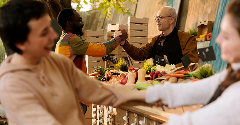
New environmental food scoring standards emerge
30 Sep 2024
EIT Food and Foundation Earth collaborate to launch environmental food scoring for products entering the global supply chain.
Read more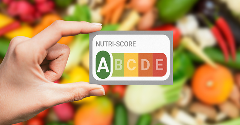
Danone removes NutriScore from products
20 Sep 2024
Following an algorithm update that gives some of its sweetened drinks a worse score, Danone has removed the front-of-pack label, NutriScore, from all of its products – putting profit before public health, say campaigners.
Read more
Nestlé develops a new fat reduction method for dairy ingredients
26 Aug 2024
A Brazil-based Nestlé research and development team has developed a way to reduce the fat in milk powder by as much as 60%, without impacting the key characteristics that consumers enjoy.
Read more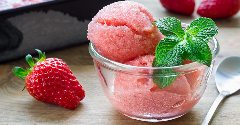
Better Juice expands its range to sorbets
16 Aug 2024
Food tech startup Better Juice has developed a technology to reduce the sugar content in fruit sorbets. The process retains the natural vitamins, minerals, and flavours of fruit, while offering manufacturers an easy-to-implement and scalable solution t...
Read more
German study reveals high sugar, fat, and salt levels in children's foods
13 Aug 2024
The food industry is making slow progress in reducing the high levels of sugar, fat, and salt in German food and beverage products marketed to children, according to the Max Rubner Institute (MRI).
Read more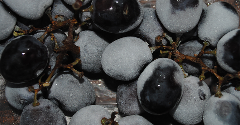
Swedish court overturns prohibition on winery’s use of imported frozen grapes
12 Aug 2024
Swedish company Drood Winery has successfully challenged the Swedish Food Agency’s decision to prohibit the production and sale of their product made from frozen grapes imported from Iran.
Read more
Paris Olympics: Food and beverage brands champion health, fun, and sustainability
5 Aug 2024
Food and beverage brands are aligning with the Paris Olympics 2024 Food Vision, which emphasises sustainability, local sourcing, and plant-based diets.
Read more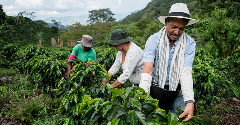
The coffee supply chain is failing farmers, says Solidaridad
30 Jul 2024
The coffee industry’s economic model means its profits do not reach farmers, despite there being enough value to be shared all along the supply chain, according to a new report by Solidaridad Network and IDH.
Read more